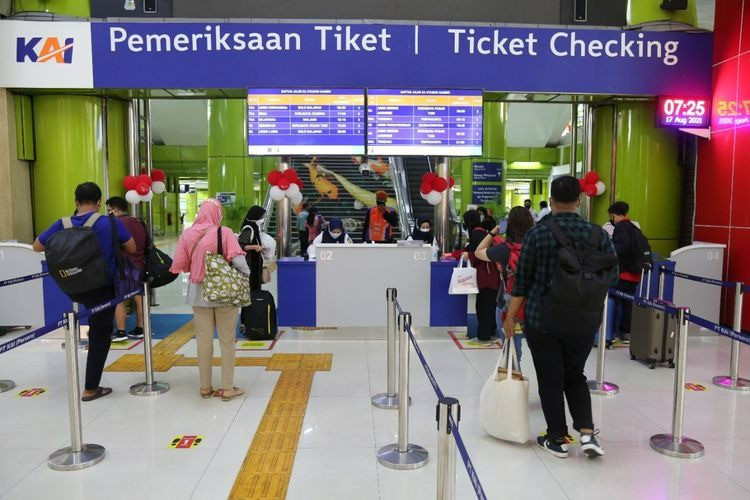New regulation sends mixed signals on holiday curbs
Under the regulation, which was issued by Home Minister Tito Karnavian on Monday, the central government has asked regional administrations to urge the public to limit their “nonessential” mobility and tighten border restrictions in anticipation of an influx of Indonesian migrant workers returning from abroad over the holiday period.
Change Size

T
he government has issued a new regulation that outlines its strategy for preventing another wave of COVID-19 cases during the year-end holiday, which includes calling on the public to refrain from traveling during the festive period.
Under the regulation, which was issued by Home Minister Tito Karnavian on Monday, the central government has asked regional administrations to urge the public to limit their “nonessential” mobility and tighten border restrictions in anticipation of an influx of Indonesian migrant workers returning from abroad over the holiday period.
The regulation, which will be in force between Dec. 24 and Jan. 2, 2022, also mandates the implementation of level 3 public activity restrictions (PPKM) – the second-most stringent level of the four-tiered curbs – for specific places, such as tourist destinations, churches and shopping malls, as well as certain activities such as wedding receptions.
However, unlike year-end restrictions imposed in 2020, which saw closures of the country’s main thoroughfares, the newly issued instruction does not mandate similar measures, sending a mixed signal to the public as more stringent curbs were expected following the government’s announcement last week of nationwide level 3 PPKM over the year-end holiday period.
In lieu of tighter travel curbs, the government has set up a number of health precautions geared to limit public mobility.
“In general, the odd-even policy [will be imposed to limit] public mobility. Meanwhile, the requirement to present a negative COVID-19 test for [essential] travel and using the PeduliLindungi app when entering public facilities will remain,” said National COVID-19 task force spokesperson Wiku Adisasmito on Thursday.
He went on to add that public order agencies (Satpol PP), the police and military personnel would set up checkpoints, particularly near residential areas, to monitor compliance with health protocols.
According to the regulation, malls are allowed to open at 50 percent capacity but are banned from holding Christmas or New Year’s celebrations. Churches, meanwhile, are encouraged to hold “modest” Christmas services, with in-person capacity capped at 50 percent.
From Dec. 31 to Jan.1, 2022 town centers across the nation – traditionally where crowds gather for New Year’s celebrations – will also be closed, as families are instructed to hold their celebrations at home.
Read also: Indonesia to place all provinces under stricter curbs for year-end holidays
Masdalina Pane of the Indonesian Epidemiologist Associaiton (PAEI) said adherence to the government’s latest regulation was key to preventing a surge of COVID-19 cases in the upcoming year-end holiday period.
“[Unlike 2020], the difference is that we have vaccinated many more people, meaning that a semblance of herd immunity has been achieved. Our testing capacity has also improved,” Masdalina said on Thursday.
Masdalina added that higher risks of COVID-19 transmission would instead come from the arrival of international travelers over the year-end holidays.
According to the latest national COVID-19 task force quarantine policy, fully vaccinated international travelers will have to quarantine for three days, while tourists who have received only one dose of the COVID-19 vaccine will still need to quarantine for five days.
“This is what we need to be wary of. Indonesia will need to carefully guard its international borders,” Masdalina said.
As part of its strategy to limit people’s mobility, the regulation also bans civil servants, police officers, members of the military as well as private office employees from taking leave during the end-of-year holidays.
Meanwhile, other workers are “encouraged” to not take their leave during their holiday period. Students are in a similar position, as schools are urged not to allocate a specific Christmas or New Year’s vacation for their students.
The regulation has also banned art, sports, or social events and other activities that could attract any crowds, including activities synonymous with New Year’s festivities, such as fireworks and parades.
Regional heads, particularly those in Bali; Bandung and Bogor, West Java; Yogyakarta; Malang and Surabaya, East Java; as well as Medan, North Sumatra –which the government has identified as tourist hotspots -- are required to double down on their efforts to monitor tourist destinations in their areas.
These destinations will be allowed to operate at half capacity and under strict protocols, but are not allowed to hold any crowd-pulling celebrations at Christmas or New Year’s Eve. They are also required to apply an odd-even traffic policy in order to regulate the number of visitors entering premises.
Editor’s note: The third paragraph of the story was updated to accurately reflect the restrictions under the regulation.









